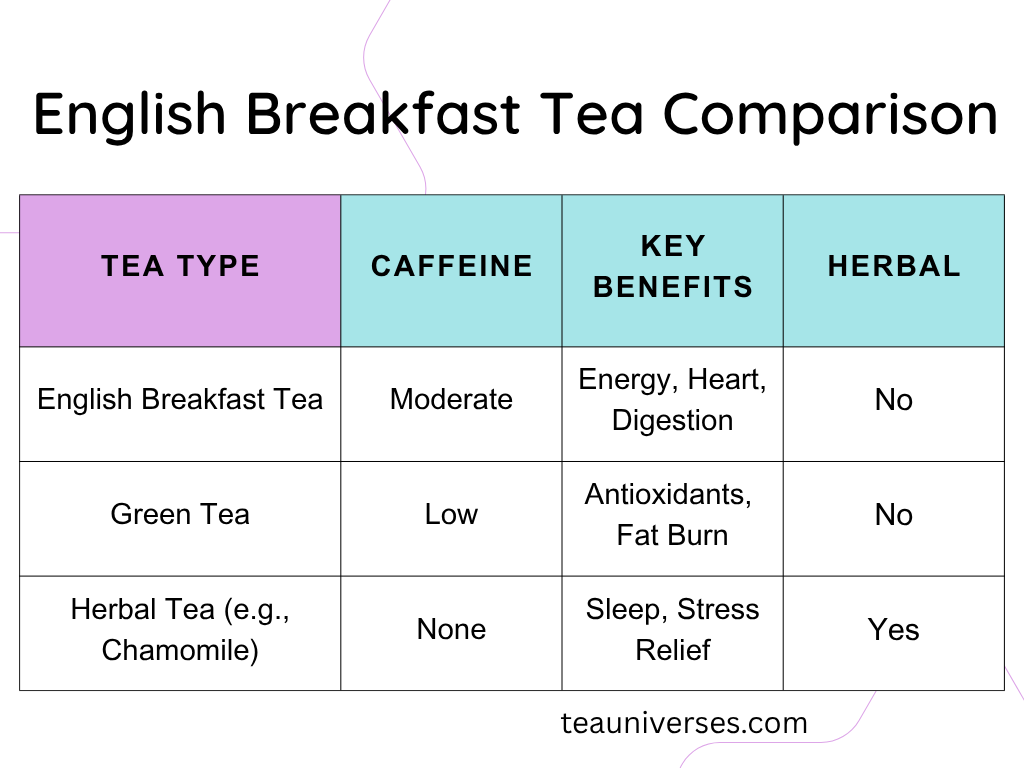Discover the proven health benefits of English Breakfast Tea — from heart health and digestion to energy and stress relief, a complete guide for tea lovers. Do you start your morning with a strong cup of tea? If so, you’re not alone. English Breakfast Tea is a beloved black tea blend that’s more than just a flavorful kickstart; it’s packed with potential health benefits. This tea contains benefits for heart health and improved focus.
In this article, I’ll explore the science-backed health benefits of English Breakfast Tea, how it compares to other teas, and tips to get the most out of your brew. Whether you’re a seasoned tea lover or just getting started, this guide has everything you need.
Health Benefits of English Breakfast Tea
1. Rich in Antioxidants

English Breakfast Tea is naturally rich in polyphenols, particularly theaflavins and thearubigins, which are potent antioxidants. These compounds play a vital role in protecting your cells from oxidative stress caused by free radicals.
Key Benefits of These Antioxidants:
- Neutralize free radicals that cause cell damage
- It may slow the signs of ageing and reduce the risk of age-related diseases.
- Contribute to a stronger immune system.
- May promote healthier skin and a youthful glow
Did you know? Theaflavins are formed during the oxidation process of black tea, and they have been studied for their anti-inflammatory and cholesterol-lowering properties.
2. Supports Heart Health
English Breakfast Tea can also support a healthier heart. It contains flavonoids, natural plant compounds known to benefit the cardiovascular system.

Science-Backed Heart Benefits:
- Helps reduce LDL (harmful) cholesterol levels (a significant risk factor for heart disease)
- Improves blood vessel function by enhancing endothelial performance (how your arteries expand and contract)
- May lower blood pressure and promote better circulation
- Regular consumption is associated with a reduced risk of heart attack and stroke.
Research
A 2020 meta-analysis published in the European Journal of Preventive Cardiology found that black tea drinkers had a 10% lower risk of heart-related events, including coronary heart disease and stroke.
Tip: For heart health benefits, enjoy 1–2 cups daily without added sugar.
3. Boosts Energy Without the Crash

Do you want an effective energy boost in the morning? English Breakfast Tea delivers a moderate dose of caffeine and the calming amino acid L-theanine, as they work together to give you clean, focused energy without the jittery side effects.
Why It’s a Smarter Choice:
- Enhances mental alertness and concentration without overstimulation
- The L-theanine promotes a calm, focused state — great for studying or working
- Avoids caffeine crashes and irritability
- Perfect for your morning routine, productivity sessions, or afternoon pick-me-ups
Unlike coffee, which spikes and drops your energy, tea offers a balanced release of caffeine, making it ideal for sustained focus.
4. Improves digestion
Drinking English Breakfast Tea after a meal is more than just tradition — it can help support your digestive health. The black tea base contains natural compounds such as tannins and polyphenols, which are known to have a soothing and stimulating effect on the digestive system.

Digestive Benefits at a Glance:
- Reduces bloating and gas, especially after heavy meals
- Stimulates the production of gastric juices, helping break down food
- Gently soothes the digestive tract, making it ideal for those with occasional discomfort.
- It can also help relieve mild nausea or upset stomachs
Pro Tip: Enjoy a warm cup of English Breakfast Tea 30 minutes after meals for optimal digestive support.
5. Supports Weight Management
While English Breakfast Tea isn’t a miracle weight loss drink, it can be a helpful tool when paired with a healthy diet and lifestyle. Rich in catechins and caffeine, black tea may help increase fat metabolism, curb hunger, and support a calorie-conscious routine — especially when enjoyed without milk or sugar.
How It May Help:
- May boost fat oxidation, helping your body burn more fat during activity
- It can act as a natural appetite suppressant when consumed plain
- Zero-calorie beverage if taken without milk, honey, or sugar, making it an excellent swap for high-calorie drinks.
- Can improve hydration, which supports metabolic processes and digestion
Swap your sugary energy drink or second cup of coffee with English Breakfast Tea to reduce calorie intake while still enjoying focus and energy.
6. Reduces Stress and Elevates Mood
The soothing ritual of sipping English Breakfast Tea can do wonders for your mind. Beyond the comfort it brings, black tea contains L-theanine — a natural amino acid known for its stress-reducing and mood-enhancing properties.
Unlike sedatives, L-theanine promotes a sense of calm alertness, helping you unwind without making you sleepy.
Mental Wellness Benefits:
- Helps reduce levels of cortisol (the body’s primary stress hormone)
- Encourages relaxation without drowsiness, so you stay focused and productive.
- Supports mental clarity, making it easier to concentrate under pressure
- The warm experience of drinking tea can act as a mindful break in your day.
Research suggests that combining L-theanine with caffeine (as found in black tea) improves focus and mood simultaneously, unlike coffee, which may trigger jitters.
Comparison

How to Brew English Breakfast Tea for Best Results
To enjoy full flavour and health benefits:
- Use one tea bag or 1 tsp of loose leaf of English Breakfast Tea
- Steep for 4–5 minutes in boiling water (100°C / 212°F)
- Add milk if desired; avoid sugar.
- Drink in the morning or early afternoon
- Avoid drinking it with iron-rich meals for better nutrient absorption
Tip: Add a slice of lemon for extra antioxidants and vitamin C
Possible Side Effects or Considerations
While generally safe, a few things to note:
- Contains caffeine – avoid close to bedtime
- May interfere with iron absorption – drink between meals
- It can cause acid reflux in sensitive individuals
Conclusion
English Breakfast Tea isn’t just a morning ritual — it’s a powerful beverage with real health benefits. From heart support to digestion, mood, and energy, this bold black tea deserves a place in your daily routine.
Ready to sip your way to better health? Brew a cup today and feel the difference.
Frequently Asked Questions (FAQs)
Does English Breakfast Tea have more caffeine than green tea?
Yes, English Breakfast Tea generally contains more caffeine than green tea. A typical cup of English Breakfast Tea provides around 40–70 mg of caffeine, while green tea usually contains 25–35 mg per cup. This moderate caffeine content offers a smoother energy boost than coffee without the jitters, making it ideal for your morning routine or early afternoon productivity.
Can I drink English Breakfast Tea daily?
Absolutely. Drinking 1–2 cups daily of English Breakfast Tea is generally safe for most healthy adults and may offer several long-term benefits like:
- Better heart health
- Improved focus and digestion
- Antioxidant protection
To maximize the benefits, avoid adding sugar, and drink it between meals to prevent interference with iron absorption.
Is it okay to drink English Breakfast Tea on an empty stomach?
It depends on your tolerance. English Breakfast Tea contains tannins and caffeine, which can irritate the stomach lining or cause mild nausea in some people if consumed on an empty stomach.
If you’re sensitive to acidity or caffeine, it’s best to enjoy your tea after eating breakfast or with a light snack.
Is English Breakfast Tea safe during pregnancy?
Yes — but only in moderation. Due to its caffeine content, it’s generally recommended to limit English Breakfast Tea to one cup per day during pregnancy.
The American College of Obstetricians and Gynecologists advises keeping total daily caffeine intake under 200 mg, and one cup of English Breakfast Tea typically falls within this limit.
Always consult your healthcare provider before including caffeinated teas in your pregnancy diet.
What is the best time to drink English Breakfast Tea?
The best times to drink English Breakfast Tea are:
- In the morning, to gently energize your day
- Early afternoon, for a focus boost without disrupting sleep
- After meals, to aid digestion
Avoid drinking it in the late evening, especially if you’re sensitive to caffeine, as it may interfere with your sleep.
What happens if I drink English Breakfast Tea every day?
Drinking English Breakfast Tea daily may:
- Improve cardiovascular health
- Support mental clarity and focus.
- Aid digestion and reduce bloating
- Provide antioxidants that protect your cells.
However, if consumed in excess (more than 3–4 cups/day), it could lead to:
- Caffeine-related side effects, such as insomnia or restlessness
- Reduced iron absorption if consumed with meals
Enjoyed moderately, it’s a healthy and satisfying addition to your daily routine.
What is the healthiest breakfast tea?
While “healthiest” can be subjective, English Breakfast Tea is among the top choices for those seeking a balance of flavour and wellness. It offers:
- A good source of antioxidants
- Moderate caffeine for alertness
- Heart-supportive flavonoids
If you’re looking for lower caffeine options, consider:
- Green tea – more antioxidants, less caffeine
- Herbal breakfast teas – caffeine-free, good for digestion
For overall balance and accessibility, English Breakfast Tea is one of the healthiest traditional breakfast teas available.
Is English Breakfast Tea with milk good for you?
Yes — drinking English Breakfast Tea with milk can still provide health benefits. Milk adds calcium and a creamy texture, making the tea more palatable for many.
However:
- Milk may reduce antioxidant absorption, particularly catechins and theaflavins.
- If you’re adding sugar to the milk, it may cancel out the health benefits.
For maximum wellness:
- Use low-fat or plant-based milk
- Skip added sugars
- Limit to 1–2 cups per day.


